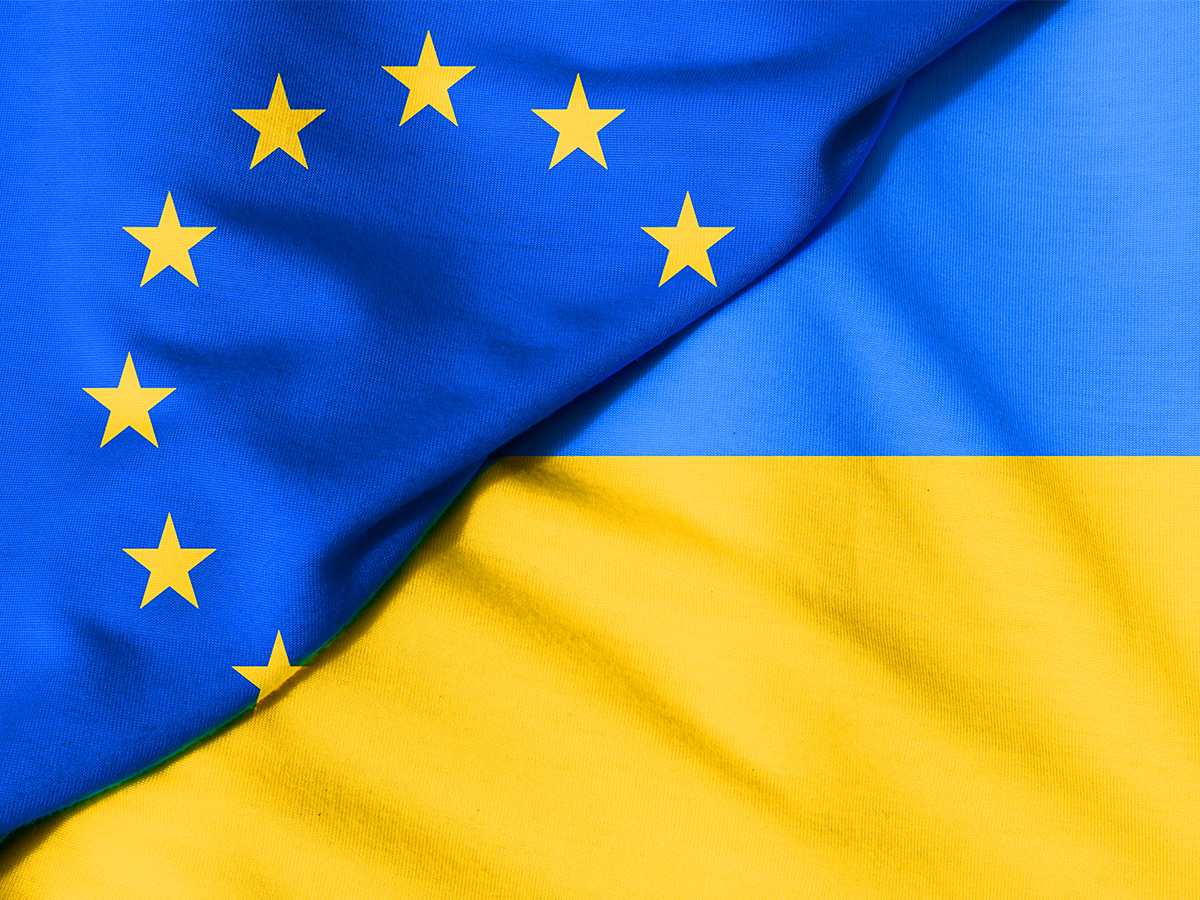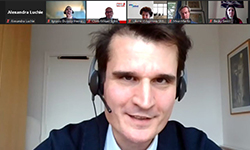BusinessEurope Headlines No. 2022-07
BusinessEurope statement on the invasion of Ukraine by Russia

European business strongly condemns the invasion of Ukraine by Russia that is currently underway. This is a clear violation of international rules, and it poses a real threat to peace and security in Europe and beyond.
Our thoughts are with the Ukrainian people in these difficult moments, and we deeply regret all human lives lost due to this invasion. Europe needs to show now its strong and effective commitment to defend international law and support Ukraine and its people, with whom the EU has strong trade and investment ties through the association agreement.
We understand the EU will now take further action through additional economic sanctions to react to Russia’s invasion of Ukraine. In order to be effective, these sanctions should be well targeted, as clear as possible and well-coordinated with relevant partners, in particular the USA, including in their implementation. Business is not happening in a vacuum and will stand behind the measures considered necessary by EU institutions. However, European businesses will be bearing the burden, including companies trading and operating in Russia. In this context, early guidance and as detailed as possible information about the economic sanctions together with supporting measures will be needed to mitigate the impact.
We also call on EU authorities and Member States to protect EU citizens and companies active in Ukraine, Russia and Belarus.
We recall that Europe’s energy market is already facing unprecedented price increases and the current crisis will accentuate the already far-reaching negative consequences for European companies and consumers. Therefore, the EU must step up its preparedness in case disruptions occur, by increasing joint efforts to secure alternative sources of supply of energy as well as of critical raw materials and components.
Going forward the EU will need to assess the overall impact of this crisis for Europe’s peace, security and economic stability, drawing all the necessary political and economic lessons.
WTO: even more relevant in face of multiple crisis
 “Today we are facing war in the middle of Europe just after the Covid-19 pandemic. Apart from the tragic human consequences, the invasion of Ukraine will bring a new economic shock just when we were slowly recovering from the pandemic”, said Luisa Santos, Deputy Director General of BusinessEurope at the event “How can an open trading system adapt to the new sustainability expectations?”, organised by the International Organisation of Employers and Business at OECD on 2 March. These multiple crisis, she added, reinforce the importance of multilateral institutions like the World Trade Organisation (WTO). They are a reminder that we need multilateralism and cooperation as opposed to unilateralism and conflict. Santos also highlighted that these last years have also shown the importance of having modern and comprehensive international rules governing the digital economy and trade. “They are important to support the economic recovery, boosting new trade opportunities while disciplining the use of the digital space and safeguarding the interests of business and consumers. In this context, the WTO e-commerce negotiations are critically important”, she concluded.
“Today we are facing war in the middle of Europe just after the Covid-19 pandemic. Apart from the tragic human consequences, the invasion of Ukraine will bring a new economic shock just when we were slowly recovering from the pandemic”, said Luisa Santos, Deputy Director General of BusinessEurope at the event “How can an open trading system adapt to the new sustainability expectations?”, organised by the International Organisation of Employers and Business at OECD on 2 March. These multiple crisis, she added, reinforce the importance of multilateral institutions like the World Trade Organisation (WTO). They are a reminder that we need multilateralism and cooperation as opposed to unilateralism and conflict. Santos also highlighted that these last years have also shown the importance of having modern and comprehensive international rules governing the digital economy and trade. “They are important to support the economic recovery, boosting new trade opportunities while disciplining the use of the digital space and safeguarding the interests of business and consumers. In this context, the WTO e-commerce negotiations are critically important”, she concluded.
Contacts: Elena Suárez, Sofia Bournou
Generalised Scheme of Preferences: key contribution of trade to development
 On 1 March, BusinessEurope published its position on the reform of the EU Generalised Scheme of Preferences (GSP). The position aims to contribute to the ongoing discussions in the European Parliament and the Council of the EU which will result in a modernised GSP that will replace the existing scheme on 1st January 2024.
On 1 March, BusinessEurope published its position on the reform of the EU Generalised Scheme of Preferences (GSP). The position aims to contribute to the ongoing discussions in the European Parliament and the Council of the EU which will result in a modernised GSP that will replace the existing scheme on 1st January 2024.
By unilaterally removing or lowering EU import duties for products from vulnerable developing countries, the EU GSP exemplifies the key contribution of trade to development, poverty eradication and economic diversification. However, the world has changed since the last GSP update: on the one hand, the UN Sustainable Development Goals set a new tone for global cooperation and the Paris Agreement has increased global collaboration in the fight against climate change. On the other hand, the Covid-19 pandemic has accelerated shifts in the global trading environment and brought disruptions to global supply chains. In the EU, initiatives such as the Green Deal and an increased focus on implementation have also shaped trade policy in recent years. These developments need to be reflected in the reformed GSP to keep it targeted and effective. At the same time, the right balance needs to be maintained between ensuring stable access to the EU market for beneficiary countries and safeguarding the EU’s interests.
The proposal of the European Commission forms a good basis for a GSP fit for today’s challenges and opportunities. The position paper of BusinessEurope makes recommendations on how to make sure that the scheme delivers both for the beneficiary countries most in need and the European business community.
![]() Contacts: Sofia Bournou, Benedikt Wiedenhofer
Contacts: Sofia Bournou, Benedikt Wiedenhofer
Active inclusion: how to achieve better results
 Active inclusion is about ensuring that employment policies and social systems work in synergy to support people in need to foster their labour market access and development. Personalised support is needed to help address the root causes of low employability of many people who are not active or unemployed. The fact that more than 20 million European workers will retire in the next twenty years makes this an economic necessity for long-term economic growth in Europe. The challenge is to support these people effectively. The main purpose is to organise the necessary employability building and social support measures through the coordination of employment and social services in the EU Member States. This should be done in close cooperation with the social partners. In particular, the fact that the inactive and the unemployed participate to a much lesser extent than workers in training activities shows that a lot more needs to be done to prepare the currently inactive or unemployed people for the changing jobs and the new jobs deriving from the twin green and digital transitions. These were the key messages passed by Maxime Cerutti, BusinessEurope Director for Social Affairs, during the French Presidency Ministerial conference on “Inclusion policies to address the challenges of recovery” that was held in Paris and online on 2 March 2022.
Active inclusion is about ensuring that employment policies and social systems work in synergy to support people in need to foster their labour market access and development. Personalised support is needed to help address the root causes of low employability of many people who are not active or unemployed. The fact that more than 20 million European workers will retire in the next twenty years makes this an economic necessity for long-term economic growth in Europe. The challenge is to support these people effectively. The main purpose is to organise the necessary employability building and social support measures through the coordination of employment and social services in the EU Member States. This should be done in close cooperation with the social partners. In particular, the fact that the inactive and the unemployed participate to a much lesser extent than workers in training activities shows that a lot more needs to be done to prepare the currently inactive or unemployed people for the changing jobs and the new jobs deriving from the twin green and digital transitions. These were the key messages passed by Maxime Cerutti, BusinessEurope Director for Social Affairs, during the French Presidency Ministerial conference on “Inclusion policies to address the challenges of recovery” that was held in Paris and online on 2 March 2022.
Contact: Anna Kwiatkiewicz-Mory
Making the best of new forms of work to underpin Europe’s employment recovery
 Diverse forms of work are essential to ensure good options for companies to employ people and for people to work in view of the changing needs and realities of employers and workers. The digital transition in particular is impacting the way companies operate, as well as how people work. Positively, new forms of work, such as platform work, provide employment opportunities for people that may otherwise not exist. Working together as social partners at EU and national levels is essential to ensure that diverse forms of work support employment growth, underpinned by well-designed and balanced labour laws, employment and social policies. To ensure in the future regular and improved coordination between social partners, national governments, and the European Commission at EU and national levels, BusinessEurope has proposed the creation of two new EU tripartite advisory committees on employment and social protection.
Diverse forms of work are essential to ensure good options for companies to employ people and for people to work in view of the changing needs and realities of employers and workers. The digital transition in particular is impacting the way companies operate, as well as how people work. Positively, new forms of work, such as platform work, provide employment opportunities for people that may otherwise not exist. Working together as social partners at EU and national levels is essential to ensure that diverse forms of work support employment growth, underpinned by well-designed and balanced labour laws, employment and social policies. To ensure in the future regular and improved coordination between social partners, national governments, and the European Commission at EU and national levels, BusinessEurope has proposed the creation of two new EU tripartite advisory committees on employment and social protection.
These were the key message by Maxime Cerutti, BusinessEurope Director for Social Affairs, during the European social partners meeting on “New forms of work” that was held on 24 February. This meeting brought together EU, national and sectoral social partner organisations. It was the fifth meeting organised as part of the social partners’ autonomous activities aiming to improve the performance of labour markets and social systems. Experts from Eurofound and the Organisation for Economic Co-operation and Development (OECD) also shared their research findings with the participating social partners on how social dialogue can help contribute to optimising the opportunities and tackle the challenges that new forms of work pose to the functioning of European labour markets.
Contact: Rebekah Smith
BusinessEurope’s position paper on the digital product passport
 One of the key challenges for circular economy is the lack of information transfer across the value chains. The European Commission intends to address this problem in its Sustainable Product Initiative proposal, to be published at the end of March, by setting requirements for a “digital product passport”. Ahead of the Commission’s proposal, BusinessEurope makes a number of suggestions on how to facilitate this flow of information in a way that the circularity and reparability of a product are improved, and sensitive and critical information is protected. In this position paper, the EU business community recommends the Commission to respect the “need to know” and “data minimisation” principles, and to tailor the disclosure of data to specific product groups, recipients’ needs and sensitivity considerations. To limit administrative burden and reap the benefits of the digital product passport, BusinessEurope further suggests to make existing databases interoperable and incorporate the SMEs’ needs and peculiarities.
One of the key challenges for circular economy is the lack of information transfer across the value chains. The European Commission intends to address this problem in its Sustainable Product Initiative proposal, to be published at the end of March, by setting requirements for a “digital product passport”. Ahead of the Commission’s proposal, BusinessEurope makes a number of suggestions on how to facilitate this flow of information in a way that the circularity and reparability of a product are improved, and sensitive and critical information is protected. In this position paper, the EU business community recommends the Commission to respect the “need to know” and “data minimisation” principles, and to tailor the disclosure of data to specific product groups, recipients’ needs and sensitivity considerations. To limit administrative burden and reap the benefits of the digital product passport, BusinessEurope further suggests to make existing databases interoperable and incorporate the SMEs’ needs and peculiarities.
![]() Contact: Carolina Vigo
Contact: Carolina Vigo
Essential Use Concept: valid solution if applied in targeted manner
 In the context of the upcoming revision of the REACH (Registration, Evaluation, Authorisation and Restriction of Chemicals) regulation, the European Commission is currently assessing the integration of an Essential Use Concept (EUC). The broad spectrum of industries and value chains, which strongly depend on the availability of chemicals, is particularly interested in this debate as their activities could be heavily impacted by the definition of what is going to be considered “essential”. As outlined in BusinessEurope’s position paper, the proposed EUC represents a departure from the current risk-based regulatory approach and poses a number of challenges and potential risks such as unclear definitions, substitution by less sustainable alternatives or delay in regulatory decisions. BusinessEurope argues that it is therefore paramount to ensure the possible integration of the EUC in a way that it can enhance the system’s ability to regulate harmful substances without putting breaks on much needed innovation and competitiveness of industry. The EUC could therefore be a valid solution only if applied in a targeted manner, i.e., in case of proven risks to the health and environment, difficulties in managing these risks, and if no acceptable alternatives or substitutes exist.
In the context of the upcoming revision of the REACH (Registration, Evaluation, Authorisation and Restriction of Chemicals) regulation, the European Commission is currently assessing the integration of an Essential Use Concept (EUC). The broad spectrum of industries and value chains, which strongly depend on the availability of chemicals, is particularly interested in this debate as their activities could be heavily impacted by the definition of what is going to be considered “essential”. As outlined in BusinessEurope’s position paper, the proposed EUC represents a departure from the current risk-based regulatory approach and poses a number of challenges and potential risks such as unclear definitions, substitution by less sustainable alternatives or delay in regulatory decisions. BusinessEurope argues that it is therefore paramount to ensure the possible integration of the EUC in a way that it can enhance the system’s ability to regulate harmful substances without putting breaks on much needed innovation and competitiveness of industry. The EUC could therefore be a valid solution only if applied in a targeted manner, i.e., in case of proven risks to the health and environment, difficulties in managing these risks, and if no acceptable alternatives or substitutes exist.
![]() Contact: Maximilian Mauthe
Contact: Maximilian Mauthe
Multi-association letter on India’s Data Protection Bill
 BusinessEurope, together with several other organization from different regions, co-signed a letter on India’s Data Protection Bill (DPB) and more specifically on India’s Joint Parliamentary Committee Report. This report will form the basis of the new DPB Data Protection Bill. It contains a number of concerning elements that, beyond impacting the ability of firms across sectors to do business in India, stands to set a particularly detrimental precedent with respect to the regulation of non-personal data, data localization, and restrictions on the cross-border movement of data. The letter raises these concerns and requests the Indian Authorities to urgently conduct additional stakeholder consultations before the introduction of the DPB Bill in Parliament, given the wide-ranging impact and ramifications of the report’s recommendations.
BusinessEurope, together with several other organization from different regions, co-signed a letter on India’s Data Protection Bill (DPB) and more specifically on India’s Joint Parliamentary Committee Report. This report will form the basis of the new DPB Data Protection Bill. It contains a number of concerning elements that, beyond impacting the ability of firms across sectors to do business in India, stands to set a particularly detrimental precedent with respect to the regulation of non-personal data, data localization, and restrictions on the cross-border movement of data. The letter raises these concerns and requests the Indian Authorities to urgently conduct additional stakeholder consultations before the introduction of the DPB Bill in Parliament, given the wide-ranging impact and ramifications of the report’s recommendations.
![]() Contact: Elena Suárez
Contact: Elena Suárez
Calendar 
- 7 March: Trade policy and European strategic autonomy
- 7-8 March: European Climate Conference
- 9 March: A successful transition: from accessible low-carbon energy to sustainable finance
- 9-10 March: Equality Forum: Solutions for gender equality in Europe
- 15 March: Conference on the right to disconnect and telework
Not yet a subscriber? Register here.
Reminder: please have a look at our privacy policy